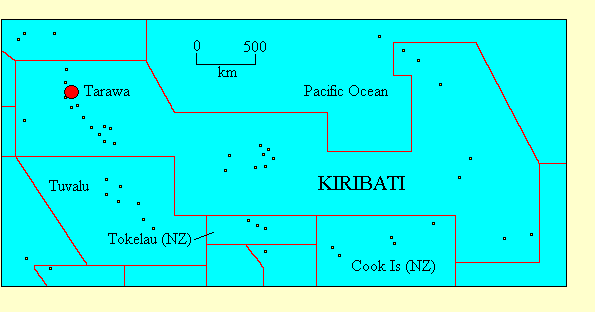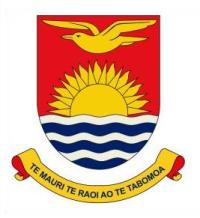
REPUBLIC OF KIRIBATI
• Official name: Republic of Kiribati
• Location: Pacific
• International organisations: African, Caribbean and Pacific Group of States, Commonwealth of Nations,
Pacific Islands Forum, United Nations
• Borders: None
• Coastline: Pacific Ocean
• Land area: 811 Km2
• Population: 98,000
• Annual GDP (PPP) per capita: US$6,100 (2009 CIA estimate). World ranking: 107
• Ethnicity: Almost the entire population are Kiribatians, a Polynesian people
• Languages: English is the official language and is generally understood. The people speak I-Kiribati, a Polynesian
language.
• Religion: 52% Catholic Christians, 42% Protestant Christians.
• Form of government: Presidential democratic republic. Kiribati is divided into three regions.

• Capital: Tarawa
• Constitution: The
Constitution of the Republic of Kiribati came into effect on 12 July 1979.
• Head of state: The President, elected by direct universal suffrage for a four-year term.
• Head of government: The President, who appoints the Cabinet.

• Legislature: Kiribati has a unicameral legislature, the House of Parliament
(Maneaba Ni Maungatabu), which has
42 seats; 39 elected by popular vote for four-year terms, one ex officio member (the Attorney-General), one appointed
to represent the island of Banaba, and one other.
• Electoral authority: Kiribati Electoral Office, Ministry of Home Affairs and Rural Development, administers national elections
• Freedom House 2009 rating: Political Rights 1, Civil Liberties 1
Political history
The Gilbert Islands were discovered and named by a Russian sea-captain in 1820 - Kiribati (pronounced Kiribass) is
the local pronunciation of "Gilbert." The islands were were united in 1892 with the Ellice Islands
(now Tuvalu) and the Line Islands as the Protectorate of the
Gilbert and Ellice Islands in 1892, and became a colony in 1916. The islands were occupied by Japan from 1941 to 1943,
and the recapture of Tarawa by United States forces in 1943 was one of the bloodiest battles of World War II. Internal
self-government was granted in 1972. Kiribati and Tuvalu were separated in 1975, and Kiribati became fully independent in
1979: with a population of less 100,000 it was one of the smallest countries in the world.
Kiribati's first president, Ieremia Tabai, served for three terms from 1979 to 1991. Since his retirement
Kiribati politics have been increasingly unstable, with two presidential elections in 2003. There are two political
parties in Kiribati, Boutokanto Koaava (Pillars of Truth), Maneaban Te Mauri (Protect the Maneaba), which serve
mainly as vehicles for the rivalry between the current President, Anote Tong,
and his brother Harry Tong. Anote Tong has been president since 2003 and was easily elected to a second term in 2007.
Updated January 2010
|

